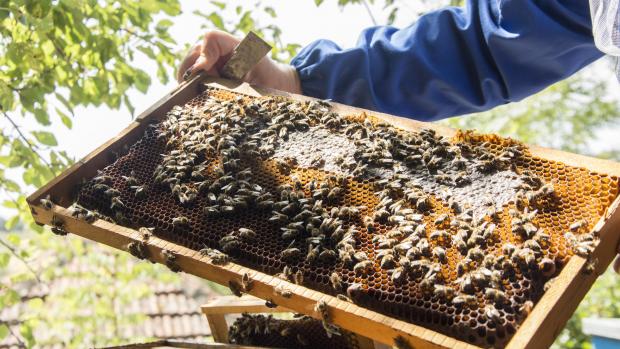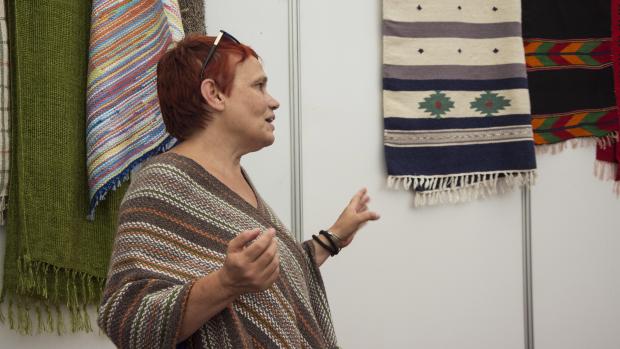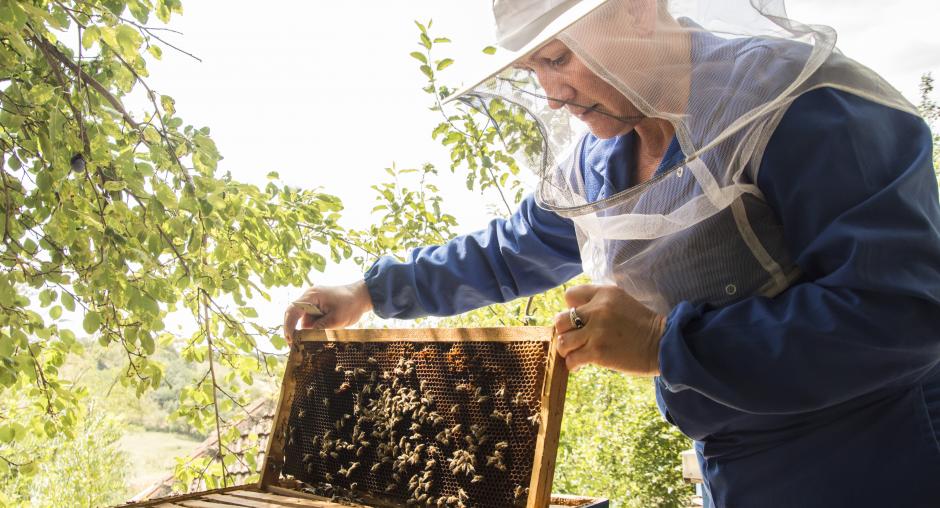Empowering Kosovo’s women entrepreneurs
Valbona Salihu walks up the street to the top of the hill in her village of Syriganë/Suvo Grlo and opens her arms to extend a warm greeting. The hill is where she meets clients to lead them to her home nearby, where she lives with her husband and three children and manages her family business.
Her village lies in the north-western part of the municipality of Skenderaj/Srbica, whose inhabitants, Kosovo Albanians and Kosovo Serbs, make their living mainly from agriculture and farming, as in most of rural Kosovo. However, the money earned from agriculture and farming barely covered Valbona’s basic family needs, so she started raising bees in an attempt to provide more.
“I had to do something, so I joined an NGO that helps women. In 2009 I got two beehives as a donation. I attended every training course I could to learn how to work with them. And not without results,” she smiles.
Currently Valbona has eight hives and generates income for the whole family.

Building skills and networks
To help Valbona and other women like her to improve their management skills and build up businesses, the OSCE Mission in Kosovo organized a series of six training sessions in June 2017 on project cycle management, marketing and branding, and drafting business plans. More than 40 businesswomen from different communities in Mitrovicë/Mitrovica and Pejë/Peć regions attended. According to Valbona, the sessions were very useful and helped her link her practical experience with professional know-how.
“Most of these women started their businesses from scratch and have travelled a long road since then, mostly on their own or with a little support from their families and civil society organizations. They wanted to do better, so they approached us and asked if we could help them with targeted training, which we were happy to do,” said Oliver Schuett of the OSCE Mission.
The Mission also organized a Trade Fair for the women on 13 and 14 July 2017 in Prishtinë/Priština. “We thought that giving them a chance to come to the capital and expose their products would allow them to see the potential of a wider market, make contacts and possibly learn useful tips from one another,” says Schuett. “Both events were a great opportunity to increase interethnic co-operation and dialogue and, ultimately, networking among businesswomen,” he added.

Difficult position of women
One of the topics covered in the training was the right of women to property. Schuett says that the topic was included because figures on women owning property are “really disheartening”. According to a Swedish International Development Cooperation Agency gender profile for Kosovo released in 2014, only 8% of property was in women’s names, which makes starting a business or getting a loan difficult for them.
The position of women is no better in other areas. According to the gender profile, women make up only 18% of the formal labour market, and women are owners of less than 10% of all registered businesses.
“Being a women entrepreneur in Kosovo, no matter whether it is in the north or the south, is hard. It takes a lot of patience, work and effort to start a business,” says Ljiljana Dražević, owner of a weaving shop in Mitrovica/Mitrovicë North, who also participated in the Mission’s training and Trade Fair.
She says the OSCE training increased her knowledge of marketing. “The event was a great opportunity to exchange views on how to include more women in entrepreneurship and establish contacts also among different ethnic groups, despite the language barrier,” she said.
Valbona and Ljiljana are both happy they had the opportunity to communicate with other women entrepreneurs. “It was a good opportunity to network,” says Valbona, while Ljiljana says: “we presented ourselves, our work and our identity through our products”.
“My message to all the women who want to be entrepreneurs is to have their own goal and follow it bravely. With honest work, a good business idea and commitment they can succeed. I know how hard it is to start from zero, but it’s worth the fight,” Ljiljana concluded.
Valbona plans to carry on with her hard work, and said that now she cannot imagine herself without her bees. “You can be in God knows what state, but when you work with them, and you listen to all that buzz, you feel great.”
The OSCE Mission in Kosovo will continue to encourage women’s empowerment through community dialogue between women entrepreneurs in Kosovo. Building on the success of this year’s Trade Fair, it will organize another in 2018, on a larger scale and with more entrepreneurs.

